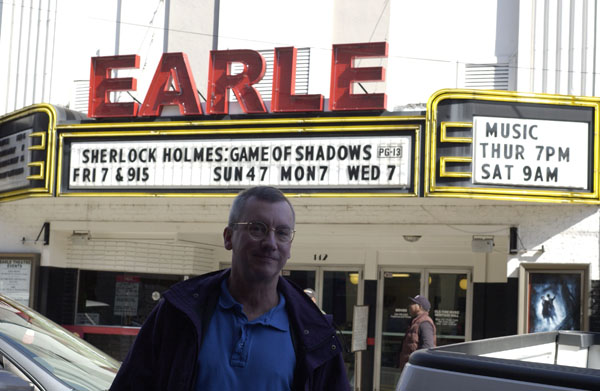One of the many reasons I don’t eat out much is that there aren’t many places to go. One comes across places that you really want to like — like Tuggle’s Gap restaurant near Floyd, Virginia, near the Blue Ridge Parkway — but almost always you’re disappointed.
As late as the 1970s, there were still good roadside restaurants. They had honest foods cooked from scratch. Some of them are still in business. They’re nothing like they used to be. I’m not sure why this is. One possibility is that the food service industry has pushed a lot of labor-saving institutional food off on them, and now every place is the same. The individuality and adventure is lost. Another reason, I think, is that in these parts restaurants compete on price, not quality. When I was in San Francisco, friends visiting from back east were often shocked at the cost of eating out. But there is a big difference. In a good food city like San Francisco, restaurants compete on quality, not price. Price doesn’t matter. In these parts, that’s too small a niche. Take pizza, for example. I had a visitor in San Francisco who, upon taking the first bite of home-delivered North Beach pizza, raved about how good it was and said she’d never had such good pizza in her life. Yep. That pizza probably cost 22 bucks. Around here, pizza is worse than pathetic, because the price point is closer to 10 bucks that 20.
Southern eateries rarely — very rarely — produce edible homestyle Southern cooking anymore. Again, I think this is partly because of the intrusion of the food service industry, partly the fact that they have to keep prices low, and partly because there just aren’t as many good cooks as there used to be. One exception is Hillbilly Hideaway near Walnut Cove, which has done a pretty good job of keeping its standard up. I’ll review Hillbilly Hideaway sometime.
But back to Tuggle’s Gap. Tuggle’s Gap ought to do better, because its closeness to the tourist traffic on the Blue Ridge Parkway allows it to get away with charging higher prices. But I had an enchilada plate there yesterday that was pathetic. The enchiladas were hard and bland. The plate was decorated with sorry-looking iceberg lettuce and sorrier tomatoes. The rice wasn’t seasoned, it was just red. Have I mentioned that Southerners are terrified of spices other than pepper and cinnamon? And you’d think that they’d at least be able to do pinto beans right, but the beans were undercooked. Doesn’t every Southern cook know the blow test? If you blow on a spoonful of beans while they’re cooking, if any of the skin curls, the beans are NOT DONE. The skins must be completely softened, and there will be a soupy broth that is starting to thicken. How thick you make the broth is a matter of personal preference, but it absolutely must not be watery.
I should have known better than to order Mexican, but I was deceived into thinking that because Tuggle’s Gap aims at a fancier standard, they’d know what they were doing. Wrong. It is a common syndrome in these parts. You can get Chinese food that obviously was cooked by someone who has never eaten Chinese food. And you can get Mexican food cooked by someone who obviously has never eaten Mexican food, someone who has never eaten more than 20 miles from home. So what you get is a kind of white trash concept of what those foods would be like. At $9 a plate, there is no excuse.
By the way, when I use the term “white trash,” I speak proudly of my own ethnicity. I’m also thinking fondly of the White Trash cookbook, which I fondly recall was part of the countertop reading at the Lighthouse Restaurant in Sausalito, California. The lighthouse usually had cooks trained at the Culinary Institute of America (or, CIA cooks, as they call them). If you know your stuff, you probably also know stuff about white trash cooking.
Anyway, if you go to Tuggle’s Gap, order a burger with fries or onion rings. They can understand that. They weren’t trained by the CIA. They don’t understand anything else.




































